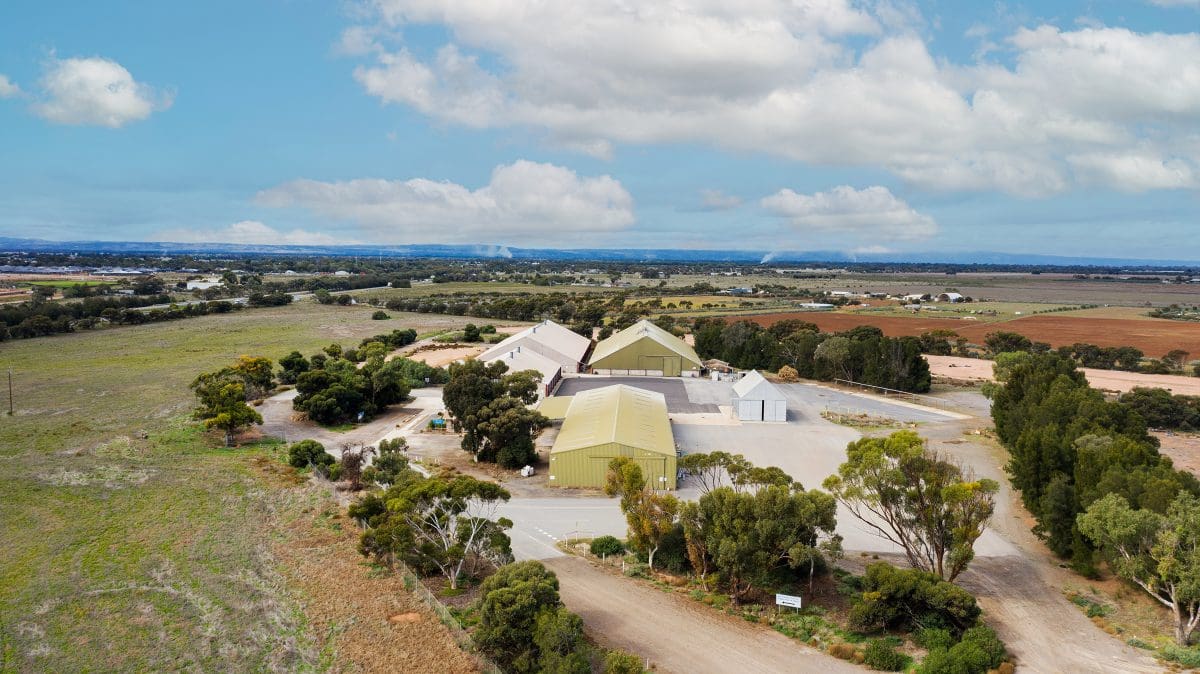
The Two Wells site developed by Pea & Grain Exporters in the 1980s has been sold by Viterra. Photo: CBRE
THE sale of Viterra’s Two Wells site has closed the opening chapter on pulse processing on the Adelaide Plains.
Established by local farmers David Verner and brothers Thorold and John Grigg as well as grain trader Allen Vater in conjunction with New Zealand company Wright Stevenson, it was by the mid 1980s one of the pioneer pulse-exporting plants in Australia.
Known as Pea & Grain Exporters Pty Ltd., it sold in the late 1990s to the Australian Barley Board, and thus became part of the Viterra stable.
Following the decommissioning of the site in recent years, Viterra listed the site for sale with CBRE.
It has been sold to a local company which operates heavy machinery.
“It’s going down a completely different use – storing mining equipment,” CBRE agent Phil Schell said.
With close to 20 inspections carried out, Mr Schell it attracted very strong interest, and sold for more than $3 million.
“The bidding was very competitive; we had 15 offers at the end of the day.
“It was a really solid exercise for us and a very good result for the vendor.”
From paddock to site
Grain trader Kim Vater is the son of the late Allen “AW” Vater and is the principal of the business he established, AW Vater & Co.
Mr Vater remembers each partner in the business brought their own talents.
“David was very very cluey on the machinery and plant side of things, and he was the chairman,” Mr Vater said.
The business quickly grew to include splitting pulses and pearling barley, and former Anchor Foods employee Barry Dyer was its first manager.
AW’s skill was in trading.
“He was one of the very first people to trade peas in the 1960s, and he did business with Anchor Foods and exported in his own right.”
Pea & Grain grew with South Australia’s pulse industry, which has helped to make Australia a major exporter of faba beans, field peas and lentils.
“Rosedale was the area that first started with peas,” Kim Vater said, adding that “production area grew hand in hand with expanding capacity from Pea & Grain in the early years.”
AW was the son a sharefarmer, and grew up on Greenhills, a farm he bought later in the early 1970s when he became a farmer as well as a trader and transport operators after buying his first small farm at Manoora in 1968.
Pea & Grain was a major focus of his attention in the 1980s and 1990s, and was built up from nothing.
“It was just a paddock to start with.
“In the first year we had it, we’d put peas in open-topped silos, and we stored in silos opposite the railway station in Gawler.”
The business was handling up to 50,000t of product per annum at its peak, and is believed to be South Australia’s first up-country pulse value-adding facility.
Mr Vater said the installation of the site’s first grid, which enabled trucks to empty straight on to ground level, hit sea water when the pit got to the required depth, but some engineering quickly solved the problem
“In the second year we had a big bumper crop, and we had really good support from local farmers.”
Plant expanded to handle growing export demand, and Kim recalls AW bought an old pea-splitting plant out of Sydney, part of which was added to the equipment at Pea & Grain.
“It was odd bits and pieces stuck together, but it all worked.”
Expansion of the business saw a European-based partner, Alfred C. Toepfer International GmbH come in which added Hermann Thoelke to the management team.
“It was getting that big we needed an injection of funds and Toepfer International came in.”
“After a while we wanted more storage, and ended up selling.”
Fertile ground
Just beyond Adelaide’s northern fringe, several companies are now packing pulses and pulse products into containers for export to South Asia and other markets.
They include Australian Grain Export at Dublin and Plains Grain at Mallala.
While they have experienced the same difficulties in terms of expense of shipping, and supply problems with boxes, they are nonetheless part of a dynamic export program ex Port Adelaide.
It includes three bulk handlers in Cargill, Semaphore and Viterra that can load bulk cargoes of pulses, a claim no other port in Australia can make, and with container capacity also.
Grain Central: Get our free news straight to your inbox – Click here



HAVE YOUR SAY